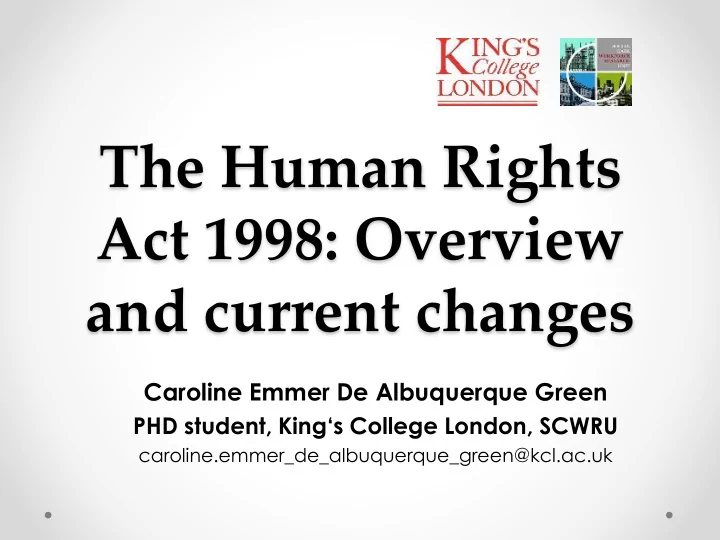

The Human Rights Act 1998: Overview and current changes Caroline Emmer De Albuquerque Green PHD student, King‘s College London, SCWRU caroline.emmer_de_albuquerque_green@kcl.ac.uk
“Documents expressing ideals carry no weight unless the people know them, unless the people understand them, unless the people demand that they be lived...“ (Eleanor Roosevelt, Chair of the United Nations Human Rights Commission 1884 – 1962)
1. What are Human Rights and what is the Human Rights Act 1998? 2. Common uses of the Human Rights Act 3. An uncertain future for the Human Rights Act?
1. What are Human Rights? Human Rights are...: a moral and legal concept the rights and freedoms we all have simply because we are human beings
Very short history of human rights Roots all the way back into the fifteenth century (Magna Carta) and other laws (e.g English Bill of Rights 1688) After second World War, modern human rights laws came into being, Winston Churchill was one of the early, main advocates for this Today, we have human rights laws on the international, European and national level
The Human Rights Act 1998 Law passed by Labour government in 1998 and came into force in 2000 Law enables the European Convention on Human Rights 1950 to be enforced in British courts All new laws must be compliant with the Human Rights Act
Included in Human Rights/Freedoms The right to life Prohibition of torture or inhuman or degrading treatment The right to liberty and security The right to respect for private and family life
Who is responsible for ensuring Human Rights? Government/Public Authorities Business owners and managers You and me
2. Uses of the Human Rights Act Human rights principles underpin laws and policies e.g Mental Capacity Act 2005 Care homes are bound by the Human Rights Act 1998 through Section 73 of the Care Act 2014 and through Care Quality Commission regulation Human Rights Act 1998 gets used in court e.g. in cases of abuse and neglect, or care home closures
3. An uncertain future for the Human Rights Act Brexit is separate to this debate , as the European Convention of Human Rights is not EU law Ongoing debate timeline: 2006: Prime Minister Cameron announces plan to replace HRA with a British Bill of Human Rights 2010/2015 : Manifesto commitment in general elections 2016: Justice Secretary (Liz Truss) revisits plan after BREXIT vote 2017: Justice Secretary announces plan to put this on hold until Brexit arrangements are finalised
Why is there such a debate? Feeling of dispossession of power, given to non- British judges interferring with ‚British affairs ‘ (Tugendhat 2017 p. 207) Term human rights and the HRA have been used heavily by groups such as offenders (Tugendhat 2017 p.206)
So what? Uncertain whether or not the Human Rights Act will be repealed at all If so, what the British Bill of Human Rights would look like But it is certain that human rights will stay an integral part of the British legal system
“Any proposed changes to human rights law must not weaken the protections we all enjoy, jeopardise (Britain‘s) remarkable history of upholding human rights, nor move the country backwards .“ (David Isaac, Equality and Human Rights Commission, September 2016)
Recommend
More recommend